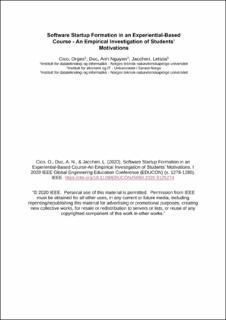| dc.contributor.author | Cico, Orges | |
| dc.contributor.author | Nguyen Duc, Anh | |
| dc.contributor.author | Jaccheri, Maria Letizia | |
| dc.date.accessioned | 2020-10-19T10:05:50Z | |
| dc.date.available | 2020-10-19T10:05:50Z | |
| dc.date.created | 2020-08-26T20:02:45Z | |
| dc.date.issued | 2020 | |
| dc.identifier.citation | Cico, O., Duc, A. N., & Jaccheri, L. (2020). Software Startup Formation in an Experiential-Based Course-An Empirical Investigation of Students’ Motivations. I 2020 IEEE Global Engineering Education Conference (EDUCON) (s. 1278-1285). IEEE. | en_US |
| dc.identifier.issn | 2165-9559 | |
| dc.identifier.uri | https://hdl.handle.net/11250/2683598 | |
| dc.description.abstract | We added a Bootcamp external activity to our experiential-based course for first-year master students of Norwegian University of Science and Technology. Students engaged with realistic challenges from stakeholders while participating in the Bootcamp. We aimed to evaluate this year's student motivation in startup formation. We followed a mixed-methods approach combining data from a questionnaire and interviews. From the questionnaire, we found that the motivations regarding dimensions, such as startup formation increases, and the involvement of existing team members slightly decreased after Bootcamp. The interviews show that involving others--not only the existing team members--and having better funding opportunities are deemed crucial in future startup formations. The involvement in the startup formation of the existing stakeholders is still at a marginal level. The overall outcomes of the study help educators and researchers make educated decisions in relation to introducing startup formation within intensive software engineering experiential-based courses. | en_US |
| dc.language.iso | eng | en_US |
| dc.relation.uri | https://ieeexplore.ieee.org/abstract/document/9125274?casa_token=px_HAc8RfJcAAAAA:IzvPyOeFZcdOMQNTtTI1QhBmSszRL6-2q8nyPKkH2du3g8tcONczsGTcRVjKF2LZE9J7pw#full-text-header | |
| dc.title | Software Startup Formation in an Experiential-Based Course - An Empirical Investigation of Students’ Motivations | en_US |
| dc.type | Peer reviewed | en_US |
| dc.type | Journal article | en_US |
| dc.description.version | submittedVersion | en_US |
| dc.rights.holder | © 2020 IEEE. | en_US |
| dc.source.pagenumber | 1278-1285 | en_US |
| dc.source.journal | IEEE Global Engineering Education Conference, EDUCON | en_US |
| dc.identifier.doi | https://doi.org/10.1109/EDUCON45650.2020.9125274 | |
| dc.identifier.cristin | 1825386 | |
| dc.relation.project | Norges forskningsråd: 274816 | en_US |
| cristin.ispublished | true | |
| cristin.fulltext | preprint | |
| cristin.qualitycode | 1 | |
